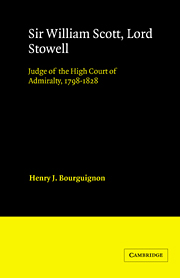Book contents
- Frontmatter
- Contents
- Preface
- List of abbreviations
- 1 Survey of English admiralty jurisdiction: how did it vanish?
- 2 Sir William Scott – a biographical sketch
- 3 The law of the instance court
- 4 Prize law: nationality – a study in detail
- 5 Prize law – a survey
- 6 Scott's judicial philosophy
- 7 Scott's influence
- Appendix: the Stowell notebooks
- Bibliography of primary sources
- Index
- CAMBRIDGE STUDIES IN ENGLISH LEGAL HISTORY
Appendix: the Stowell notebooks
Published online by Cambridge University Press: 29 October 2009
- Frontmatter
- Contents
- Preface
- List of abbreviations
- 1 Survey of English admiralty jurisdiction: how did it vanish?
- 2 Sir William Scott – a biographical sketch
- 3 The law of the instance court
- 4 Prize law: nationality – a study in detail
- 5 Prize law – a survey
- 6 Scott's judicial philosophy
- 7 Scott's influence
- Appendix: the Stowell notebooks
- Bibliography of primary sources
- Index
- CAMBRIDGE STUDIES IN ENGLISH LEGAL HISTORY
Summary
In the office of the Registrar of the Admiralty at the courts of justice in London are two notebooks ascribed to Sir William Scott, Lord Stowell. Since both are significant for the study of Scott's admiralty judgments, both merit a separate study.
One volume, which for reasons explained below will be referred to as the Simpson Manuscript, is a 7 ½- by 9 ½-inch bound notebook with the following words on the spine, ‘Copies Important Memorandums Stowell’. It contains 400 hand-numbered pages which are nearly all used, as well as some blank, unnumbered pages in the front and at the back. Since, as will be argued, this volume provides the most complete picture available anywhere of mideighteenth-century admiralty law, its significance is obvious regardless of who its author was. This full and complex manuscript will be described in detail and its author identified, but first a brief description of the much simpler second volume will be given, since a few words will suffice.
Throughout this book the second manuscript will be referred to as the Stowell Notebook, since that is the way it can be identified in the office of the Registrar. It is the same size as the first volume and has the following notation on the spine, ‘Original Important Memorandums Stowell’. It contains over 300 pages, but only pages 1 to 172 and 300 to 329 have been used, plus 8 unnumbered pages at the rear which have topics for an index. The rest of the pages are blank.
On the first numbered page of this Stowell Notebook is the notation, ‘Presented to me by Lord Stowell Judge of the Admy Wm Rothery’.
- Type
- Chapter
- Information
- Sir William Scott, Lord StowellJudge of the High Court of Admiralty, 1798–1828, pp. 286 - 293Publisher: Cambridge University PressPrint publication year: 1987



